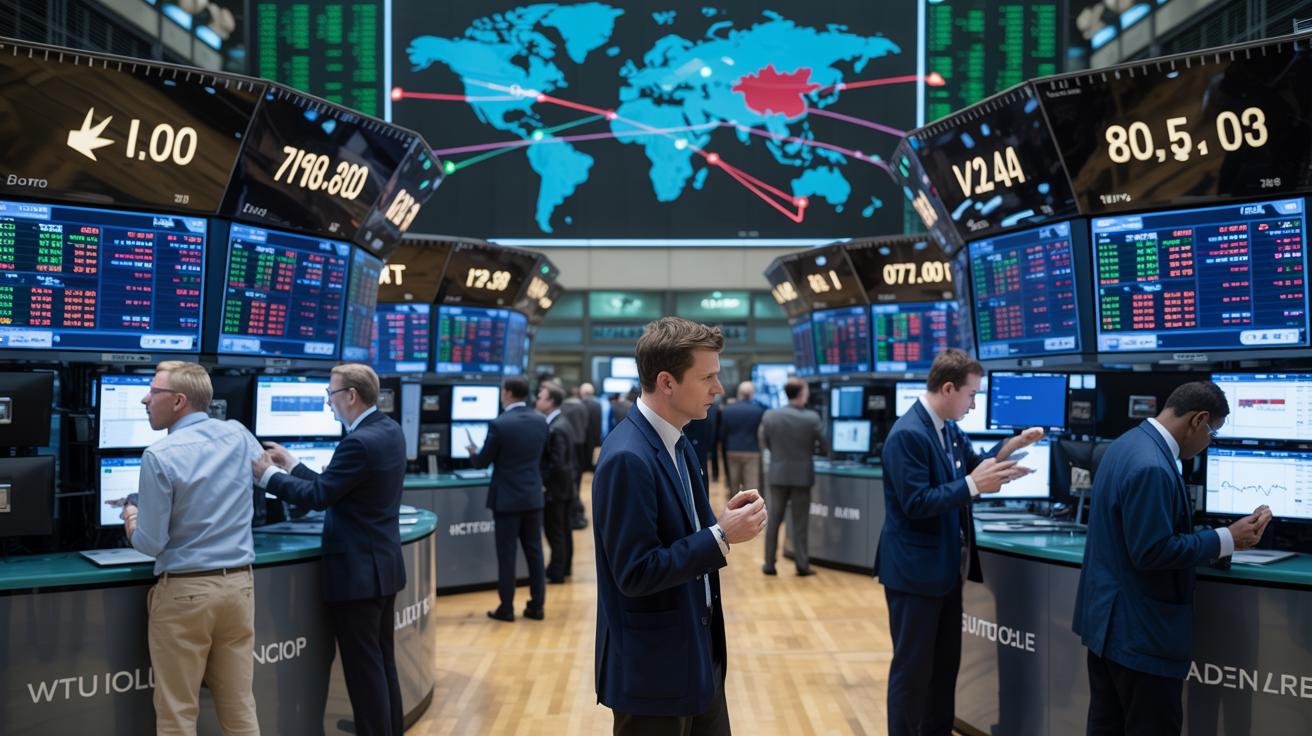What You Need to Know
- 📈 Market Alert: President Trump’s aggressive tariffs on 14 nations are set to begin on August 1, causing global market tremors.
- 🌐 Global Impact: Major economies like Japan and South Korea are among those affected, with potential disruptions in international trade relations.
- 📊 Investor Strategy: Goldman Sachs advises focusing on dividend growth stocks as a hedge against market volatility.
- 💡 Sector Spotlight: The technology and pharmaceutical sectors face significant challenges due to new tariffs and potential increased costs.
- 🛍️ Amazon Moves: Jeff Bezos’s recent sale of nearly $666 million in Amazon shares raises questions about future strategies and market confidence.
In recent days, the global financial landscape has experienced a seismic shift due to the aggressive tariff policies announced by President Donald Trump. These new tariffs are expected to have a wide-reaching impact not only on international trade but also on the domestic markets. With traders and investors on high alert, the stock market has become a focal point for monitoring these changes. As the details of these new policies come to light, the implications for various sectors, including technology, pharmaceuticals, and commodities, are becoming increasingly apparent. How will these developments shape the future of global commerce and investment?
Trump’s Tariff Surge: An Overview
President Trump’s recent announcement of new tariffs on 14 countries has sent shockwaves through the global market. These tariffs, ranging from 25% to 40%, are set to be implemented on August 1. The affected countries include major economic players such as Japan and South Korea. This bold move is part of a broader effort by the Trump administration to recalibrate trade dynamics in favor of the United States. However, this policy shift has not come without its challenges. Global markets, including the Nikkei 225 in Japan and South Korea’s Kospi, have shown mixed reactions, reflecting the uncertainty and potential volatility these tariffs introduce.
While some sectors may benefit from reduced competition, others could suffer from increased costs and supply chain disruptions. The technology sector, in particular, is poised for significant impact, given its reliance on global supply chains and international partnerships. As these tariffs take effect, stakeholders across various industries must navigate this new landscape strategically, balancing short-term challenges with long-term opportunities.
Market Reactions and Investor Anxiety
In the wake of the tariff announcement, traders and investors have been closely monitoring market movements. The initial response was muted, with stock futures showing little change. However, as details emerged, the S&P 500 and Dow Jones Industrial Average experienced slight declines, while the tech-heavy Nasdaq Composite saw a modest uptick. This mixed reaction highlights the complexity of the market’s response to geopolitical developments.
Investor anxiety is palpable as they grapple with the potential for increased volatility. Key players like Goldman Sachs are advising clients to consider stocks with strong dividend yields and growth potential as a buffer against market fluctuations. As the Federal Open Market Committee prepares to release its latest meeting minutes, further insights into monetary policy and economic projections will be critical for guiding investment strategies.
Sector-Specific Impacts: Winners and Losers
The new tariff policies are expected to have varied impacts across different sectors. For instance, the imposition of a 50% levy on copper imports could significantly affect industries dependent on this essential metal. Construction and electronics sectors, which heavily rely on copper, may face increased costs and supply chain challenges.
Conversely, the pharmaceutical sector could see a dramatic shift if the proposed 200% tariffs on imported drugs are implemented. While the Trump administration has provided a grace period of up to 18 months, this looming threat has already sparked concern among healthcare providers and consumers. As these sector-specific tariffs unfold, companies must reassess their strategies to mitigate risks and capitalize on emerging opportunities.
Jeff Bezos and Amazon’s Stock Maneuvers
Amidst these market fluctuations, Amazon founder Jeff Bezos has made headlines with his recent sale of nearly three million Amazon shares, valued at approximately $665.8 million. This sale is part of a larger plan to divest up to 25 million shares by May 2026. Despite these large-scale transactions, Bezos remains Amazon’s largest shareholder, with holdings valued at close to $200 billion.
Bezos’s stock maneuvers have sparked discussions about the motivations behind these sales and their potential implications for Amazon’s future. While some speculate that these moves are part of broader investment diversification strategies, others see them as indicative of confidence in Amazon’s long-term growth prospects. As the market digests these developments, stakeholders will be keen to understand how Bezos’s decisions align with Amazon’s strategic direction.
As the financial world grapples with these sweeping changes, the path forward remains uncertain. The interplay between aggressive tariff policies, market reactions, and corporate maneuvers underscores the complexities of modern global commerce. How will businesses and investors adapt to these evolving dynamics, and what strategies will emerge as the most effective in navigating this new economic landscape?
Did you like it?4.6/5 (20)







7 comments
Aaron_Ember
Bezos’s stock sale is interesting timing. Do you think he’s predicting further market downturns, or is it just coincidence?
dylan
Goldman Sachs is recommending dividend growth stocks as a hedge. Does anyone have tips on which ones are worth considering?
aydenquester
LOL, with all these tariffs, maybe it’s time to start investing in local businesses! 😂
eastonmonolith
I’m curious, how do these tariffs align with Trump’s overall trade strategy? Is there a bigger picture we’re missing?
harley
Yikes, a 200% tariff on pharmaceuticals? That’s gonna hurt! Hope my prescriptions don’t skyrocket in price. 😬
HenryCipher2
Thanks for the update! It’s always good to be informed about these global market changes.
GabriellaWisp
Wow, this is a bold move! Do you think these tariffs could lead to a full-blown trade war, or is it just a temporary shake-up?